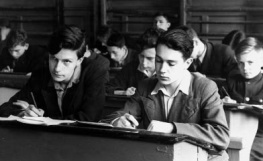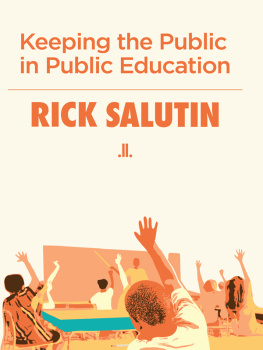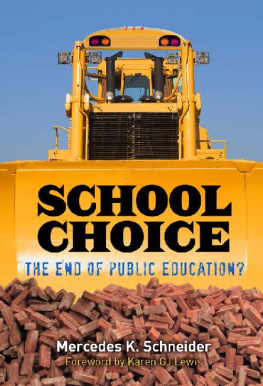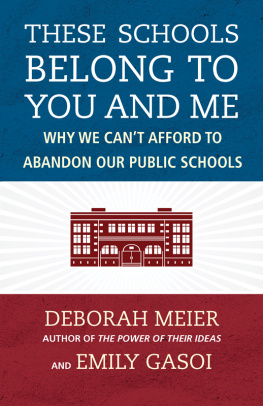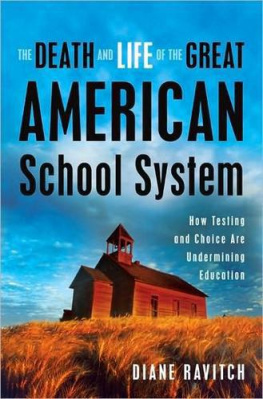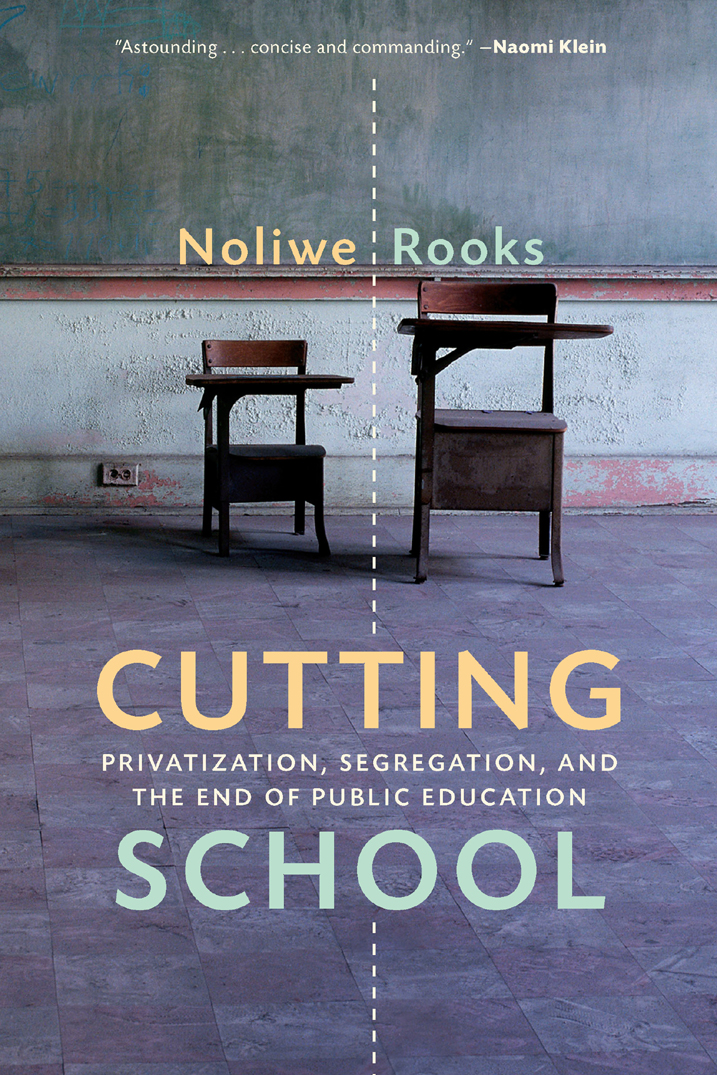
ALSO BY NOLIWE ROOKS
Hair Raising: Beauty, Culture, and African American Women
Ladies Pages: African American Womens Magazines and the Culture That Made Them
White Money/Black Power: The Surprising History of African American Studies and the Crisis of Race in Higher Education

2017 by Noliwe Rooks
All rights reserved.
No part of this book may be reproduced, in any form, without written permission from the publisher.
Requests for permission to reproduce selections from this book should be mailed to: Permissions Department, The New Press, 120 Wall Street, 31st floor, New York, NY 10005
Published in the United States by The New Press, New York, 2017
Distributed by Perseus Distribution
ISBN 978-1-62097-249-6 (e-book)
The New Press publishes books that promote and enrich public discussion and understanding of the issues vital to our democracy and to a more equitable world. These books are made possible by the enthusiasm of our readers; the support of a committed group of donors, large and small; the collaboration of our many partners in the independent media and the not-for-profit sector; booksellers, who often hand-sell New Press books; librarians; and above all by our authors.
www.thenewpress.com
Composition by dix!
This book was set in Garamond Premier Pro
Printed in the United States of America
10 9 8 7 6 5 4 3 2 1
For my stepfather, Dedan Gills,
who knew I would understand him
perfectly
when he told me
to stay out the filthy water.
For my father, Milton Rooks,
who knew I sometimes believed him
when he told me I could walk on top of it.
They both transitioned during the last few months
of my writing this book.
I hear them
still.
CONTENTS
I am the child and grandchild of educators on both sides of my family. My mother was born in Texarkana, Texas. Her great-aunt, a woman I grew up calling Grandma Isabelle, was raising my mother when she and her husband, Bill, decided to join the flow out of the South during the great migration. They settled in San Francisco in the late 1950s, my teenage mother along with them. My Grandma Isabelle did what she termed maids work, sometimes for white families, sometimes in hospitals, up until her death in the 1980s. Her husband, my Uncle Bill, worked a variety of odd jobs. However, more than what he did to earn a living, what I most recall about him was how he was able to impose his will on the hard, rocky ground in the back of their small, two-bedroom, one-bath home in the Hunters Point area of San Francisco. In defiance of the sky that was often gray and the chill of the fog-kissed wind, he made a garden grow tomatoes and okra and collard greens and cabbage.
Neither Grandma Isabelle nor Uncle Bill graduated from high school. They never even went. In the 1930s at the intersection of rural Texas and Arkansastwo heavily white-supremacist and segregated statesfunding, access, and support for Black education took a back seat to doing backbreaking work as the means of survival. For their only child, Isabelle and Bill thought the public schools of San Francisco were a yellow brick road toward a more economically and socially secure place in America. I cannot fully imagine what they must have thought when my mother, the first in her family to attend college, jeopardized her scholarly pursuits by immersing herself in the Black student protest movement at San Francisco State in the early 1960s. This was a movement formed in part to demand that both the state and federal governments honor their commitments to financially supporting education for the poor, people of color, and all disenfranchised students. For the movement, education was a political weapon in the cause for freedom. Members began tutoring programs in the ghettos of the Bay Area with a curriculum that linked individual educational freedoms to a collective narrative about justice and the role of knowledge in wresting loose the promise of the so-called American Dream for those who needed it most. For my mothers parents, educational access could lead to economic uplift and racial equity; for my mother and many others of her generation, the goal was to achieve more than equalitythey were fighting for racial justice.
On the paternal side of my family tree, my grandfather was the principal at the segregated North Ward Elementary School in Clearwater, Florida, where my grandmother was a teacher. Though they met in Clearwater, they grew up in different parts of Florida where their families farmed. Because they had bettered themselves and their situation through education, they truly believed that it was a vehicle through which each subsequent generation could rise up through the ranks of a Black, middle-class, segregated society. Education had the potential to remake the future for their children.
At the time, the idea of fully integrating into white American society did not factor heavily into their thinking about the importance of upward mobility. While recognizing that they needed a certain amount of access to resources and opportunities guarded by white privilege and anti-Black Jim Crowstyle racism, they did not imagine that such desires would necessitate leaving Black communities behind to live and work in white ones. They didnt think whites would ever allow full integration. Like many Black folks, they were also unsure that they, themselves, would want it.
In addition to his role as a principal, in the late 1950s my grandfather led a ten-yearand ultimately successfuleffort to integrate the teachers union in Florida. He wanted Black teachers to be eligible for benefits, to receive equal pay, and to have the opportunity for career advancement and job security. He paid a price for his organizing. He was shot at a number of times over the years. His home was firebombed. His life was repeatedly threatened, as were his job, the lives of his wife and son (my grandmother and father), and the lives of the teachers with whom he worked. He did not romanticize integration, but still saw education as being important for community self-reliance, uplift, and respect of Black Americans.
As for me, given my parents custody agreement following their divorce, my school years were divided almost equally between the newly integrated schools in Floridawhere my classmates where overwhelmingly whiteand schools in San Francisco, where my classrooms were for the most part of color, or all Black. In both places, I lived in Black communities. That experience, and my family history, led me to understand the tremendous influence of the segregated history of American education on our educational present. In our current moment, the type of education, the quality of the school buildings, the experience of the teachers, and the ability to graduate are vastly different depending on the racial and economic makeup of ones community. It is apartheida system that is, at its core, organized by physically separating racial groups and then privileging one racial group over another (a construct that cannot be disentangled from social class). Educational apartheid has high social costs. As discussed in the pages that follow, we can right this wrong, but first we have to take full account of the ways in which race and profit-driven interests in education have negatively impacted the futures of so many of our nations youth. This book is a step in that direction.


